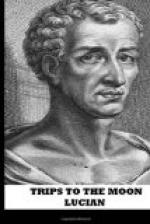The only business of the historian is to relate things exactly as they are: this he can never do as long as he is afraid of Artaxerxes, whose physician {55a} he is; as long as he looks for the purple robe, the golden chain, or the Nisaean horse, {55b} as the reward of his labours; but Xenophon, that just writer, will not do this, nor Thucydides. The good historian, though he may have private enmity against any man, will esteem the public welfare of more consequence to him, and will prefer truth to resentment; and, on the other hand, be he ever so fond of any man, will not spare him when he is in the wrong; for this, as I before observed, is the most essential thing in history, to sacrifice to truth alone, and cast away all care for everything else. The great universal rule and standard is, to have regard not to those who read now, but to those who are to peruse our works hereafter.
To speak impartially, the historians of former times were too often guilty of flattery, and their works were little better than games and sports, the effects of art. Of Alexander, this memorable saying is recorded: “I should be glad,” said he, “Onesicritus, after my death, to come to life again for a little time, only to hear what the people then living will say of me; for I am not surprised that they praise and caress me now, as every one hopes by baiting well to catch my favour.” Though Homer wrote a great many fabulous things concerning Achilles, the world was induced to believe him, for this only reason, because they were written long after his death, and no cause could be assigned why he should tell lies about him.
The good historian, {56} then, must be thus described: he must be fearless, uncorrupted, free, the friend of truth and of liberty; one who, to use the words of the comic poet, calls a fig a fig, {57a} and a skiff a skiff, neither giving nor withholding from any, from favour or from enmity, not influenced by pity, by shame, or by remorse; a just judge, so far benevolent to all as never to give more than is due to any in his work; a stranger to all, of no country, bound only by his own laws, acknowledging no sovereign, never considering what this or that man may say of him, but relating faithfully everything as it happened.




